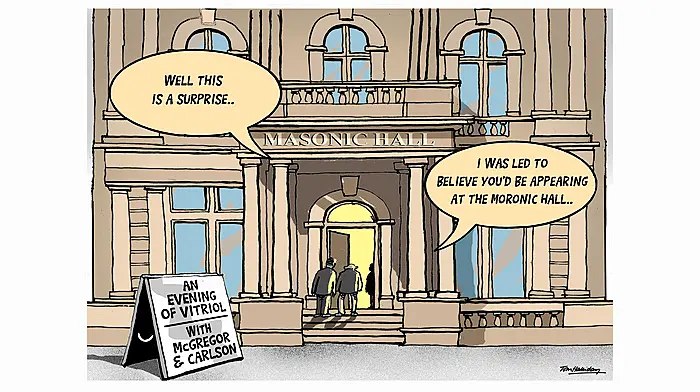The launch of the implementation strategy for the cross-party Sláintecare plan, telling us all that's going to be done to fix our health service over the coming decade, has deflected attention away from more immediate concerns rai
THE launch of the implementation strategy for the cross-party Sláintecare plan, telling us all that’s going to be done to fix our health service over the coming decade, has deflected attention away from more immediate concerns raised about a feared deficit of €800m in the Health Service Executive (HSE) budget by the end of this year. At the end of March, the deficit had already reached over €100m and, if the trend continues, who knows where it will end up and how the service will even be able to function.
Under new legislation, HSE budget overruns are not to be written off at the expense of the taxpayer so last year’s net operating deficit of just under €140m was the first item meant to come out of this year’s total budget of €14.5bn. The overall budget was increased by 4.4% (€608m), but this would have been quickly gobbled up by public sector pay restoration and other remuneration issues.
A key part of the assumptions made when putting Budget 2018 together was that the HSE would consider how to reduce the costs of delivering services without impacting negatively on either the level or quality of such services. This, it seems, was more wishful thinking.
Even though some of the expenditure incurred annually can be unforeseen in advance, especially in a harsh winter with increased level of illnesses, the HSE is a serial offender when it comes to not being able to manage its budget. It is done in other countries, so there are models out there to work from.
Last year, the HSE estimated that an extra €1.5bn alone would be needed in order to maintain existing services at the same level for 2018. However, this was disputed by the Department of Health, which seems to want the HSE to perform miracles with its allocation.
The two sides can nit-pick all they want over whose fault it is when the budget provided inevitably proves inadequate: Is it the Department’s fault for not providing enough money or the HSE’s for not spending what it got wisely?
It seems like a perpetual vicious circle with public money being swallowed up and no tangible value for money being provided, especially with the ongoing trolley crisis at emergency departments – which is not as bad at the moment but never goes away for the summer either – and growing waiting lists of public patients to be seen by hospital consultants and to receive treatment. Figures crunched by Fianna Fáil estimate that the true cumulative number of people waiting for treatment, or to be seen at an outpatient clinic, is around one million, which is nothing short of scandalous.
Some of these waiting lists are on the go so long that the HSE has, rather cynically, taken to trying to revise them downwards by engaging in a validation exercise to see how many patients on them have either died or given up on receiving the public healthcare they are entitled to. This has really annoyed the National Association of General Practitioners (NAGP), who have been complaining bitterly in recent weeks about the intrusion on their time and resources with one GP practice receiving 100 letters in one week alone from the HSE seeking validation that patients still need to be on a list.
It is difficult to argue with the NAGP’s contention that this is a cynical political ploy to manipulate waiting lists and make them appear smaller. Indeed, the HSE would be better off diverting some of its resources from such wasteful bureaucratic exercises and to usefully employ more frontline medical staff.
Even though he was leaving anyway, the departure of HSE Director-General Tony O’Brien – hastened by the Cervical Check smear test controversy which mired the HSE in even more scandal – means that someone new has to pick up the pieces and to try to make the organisation fit for purpose. None of those who took on the role in recent years could ever claim that they truly got to grips with the HSE’s myriad problems. If the predicted overrun this year hits €800m – coincidentally the amount Finance Minister Paschal Donohoe says is available in the so-called fiscal space, then maybe it’s goodbye to any meagre tax cuts people were hoping for in Budget 2019.
Theoretically, the HSE deficit should be carried forward to next year’s budget, but this is just more of kicking the can down the road and, ultimately, Irish taxpayers end up paying it one way or another. Meanwhile, Health Minister Simon Harris needs to crack the proverbial whip and demand more accountability, both within his own Department and from the HSE.
Doing the same thing over and over again won’t work and the next HSE Director-General must be prepared and be allowed to sweep clean with a new broom.








